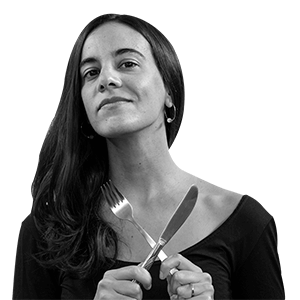René Frank: "I don't agree with the distinction between cook and pastry chef; I make non-binary dishes."
The chef of the Berlin restaurant Coda earned two Michelin stars by serving a menu consisting of dessert


René Frank (1984, Wangen im Allgäu) is the dessert chef. Or the pastry chef of the kitchen. His Berlin restaurant Coda, with two Michelin stars, opened in 2016, and since then, accolades have poured in. Among others, he's been named the World's Best Pastry Chef by 50 Best and Best Pastry Chef by Best Chef. But now he's somewhat reluctant to have his establishment described as a "dessert restaurant." He's against rigid categories, and that's why, coming from a much more conservative region of Germany, he found his place in the world in Berlin.
Frank knows Catalonia and visited the first dessert restaurant that ever existed: Espai Sucre“I haven’t invented anything, but the way I think about dessert and what I do now isn’t so similar to what’s been done elsewhere. However, Jordi Butrón was a great inspiration to me. The first time I was there, I was very impressed. Especially by his confidence in championing a dessert restaurant,” he explains.
But what makes a dish a dessert or not? Frank explains it this way: “People are more open-minded when it comes to savory dishes. It can be pasta, pizza, or sushi, and everyone makes their own version. Look at the California Roll, for example. But we’re not so open-minded with desserts, since the main element that makes a dessert a dessert is sugar. Even if it’s processed. For me, it’s not processed. For me, it’s not processed.” But the fact is that a dessert can vary greatly depending on the culture, because in both Germany and Catalonia, dessert is the last course on the menu. In English, according to Frank, the word dessert It would also work for a muffin. In China, there's no such thing as a dessert or a sweet ending. If there's anything sweet, it's usually at the beginning. And you have to keep in mind that it's a cuisine that uses a lot of sugar in cooking. The mold used in the Asian giant is different.
So, in order to subvert the established norms, Frank no longer describes his restaurant as a dessert establishment. "Now we describe ourselves as unconventional haute cuisineIt's a more developed concept. I'm no longer comfortable with the idea of us doing dessert menus. When we started in 2016, yes," he states.
Sugar plays no role
The curious thing is that this restaurant doesn't have sugar. There isn't an ounce of it in the kitchen. "Chefs make all kinds of creative dishes. For me, it doesn't matter if a dish is a dessert or not. There are restaurants inspired by Japanese techniques or French cuisine. My influence comes from pastry." This means that he's a chef who applies pastry techniques to dishes that aren't defined by their position on the menu. But the fact that pastry is his source of inspiration doesn't mean there's a lot of sugar. "Sugar has no role in my cooking. Its sweetness is natural. From fruits or vegetables. Or if necessary, from honey, for example. And we play with textures." Like the caviar-coated ice cream, like a creamy popsicle with a chocolate shell.
"In 2018, I changed the way I prepared food. All the products are fresh; there are no ultra-processed foods in my kitchen. No coloring or frozen puree." And when the second star arrived, he began incorporating savory ingredients. That's why he feels the "dessert restaurant" category has become too narrow. "I don't agree with the chef and pastry chef categories. In Berlin, everyone wants to be free, and if you, as a person, feel you don't belong to a gender category like man or woman, you can be non-binary. And the same goes for our dishes, which I call non-binary. Why does everything have to be categorized? Why do there have to be rules for everything?"
René Frank, by the way, isn't a fan of conventional pairings. "I am in favor of pairings, but not with wines. I conceive of a dish and it takes me six weeks to execute it. If I conceive of a dish, I also think about what it should be paired with. So there are dishes that already come with the perfect drink, chosen specifically for me."
He acknowledges that the only constant has been change, influenced by their location. "Berlin is a magnetic city for those who expect something different. They are very open-minded people. In Munich or Hamburg, we wouldn't have been able to open Coda." Frank explains all this in Barcelona, where he participated in a four-hands collaboration with Paolo Casagrande, the chef of the Lasarte restaurant. In the Catalan capital, he knows his message will resonate. In fact, the restaurant is packed for this special dinner, and many of the diners are very young.
